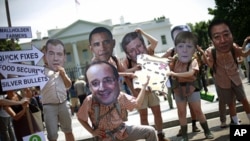WHITE HOUSE - Europe’s economic crisis is expected to dominate the discussions when the Group of Eight nations hold their economic summit near Washington on Friday and Saturday. Food security in Africa will also be high on the agenda.
The meeting at the Camp David presidential retreat will be the first G8 summit to include France’s new president, Francois Hollande.
The French leader was elected on a promise to help move Europe toward a pro-growth economic plan, and away from the austerity policy of his predecessor, Nicolas Sarkozy. Mr. Hollande will meet with President Barack Obama at the White House on Friday, before leaving for Camp David.
U.S. National Security Adviser Tom Donilon said Thursday that the Obama administration favors an approach in which Europe balances economic stimulus with austerity.
“The United States welcomes the evolving discussion and debate in Europe about the imperative for jobs and growth," said Donilon.
The European Union is America’s largest trading partner, and Donilon said the United States has an “extraordinarily significant stake in the outcome” of Europe’s economic discussions. President Obama says he is confident that Europe can resolve its economic crisis without significant help from Washington.
At Washington’s Center for Strategic and International Studies, Europe analyst Heather Conley says that Mr. Obama is more closely aligned with Mr. Hollande’s views than with those of German Chancellor Angela Merkel, who strongly supports austerity measures.
“Clearly, I think President Obama will want to send a reaffirming message that better [national budget] balancing is required for Europe, so it can quickly return to economic health," said Conley.
CSIS political economist Matthew Goodman says Mr. Obama hopes the summit will help Europe move toward solutions.
“I think the White House does not want to have a sterile debate about growth versus austerity," said Goodman. "But inevitably, that is going to be a theme in the conversation.”
The other main topic of the summit will be efforts to boost Africa’s food security and agricultural productivity. President Obama has invited the leaders of Benin, Ghana, Tanzania and Ethiopia to attend the summit.
Analyst Matthew Goodman says those four countries have made progress in improving their food situation.
“They were chosen based on the sort of underlying policy efforts that they had made to promote innovative approaches to increasing agricultural productivity and increasing investment and so forth," he said.
Goodman says he does not expect any major new commitments of money from the G8 to the African food effort.
Other issues expected to be discussed at the summit are post-war economic support for Afghanistan, tightened sanctions on Iran, and the ongoing violence in Syria.
White House officials say the G8 Summit will be the largest gathering of world leaders in Camp David’s seven-decade history.
The meeting at the Camp David presidential retreat will be the first G8 summit to include France’s new president, Francois Hollande.
The French leader was elected on a promise to help move Europe toward a pro-growth economic plan, and away from the austerity policy of his predecessor, Nicolas Sarkozy. Mr. Hollande will meet with President Barack Obama at the White House on Friday, before leaving for Camp David.
U.S. National Security Adviser Tom Donilon said Thursday that the Obama administration favors an approach in which Europe balances economic stimulus with austerity.
“The United States welcomes the evolving discussion and debate in Europe about the imperative for jobs and growth," said Donilon.
The European Union is America’s largest trading partner, and Donilon said the United States has an “extraordinarily significant stake in the outcome” of Europe’s economic discussions. President Obama says he is confident that Europe can resolve its economic crisis without significant help from Washington.
At Washington’s Center for Strategic and International Studies, Europe analyst Heather Conley says that Mr. Obama is more closely aligned with Mr. Hollande’s views than with those of German Chancellor Angela Merkel, who strongly supports austerity measures.
“Clearly, I think President Obama will want to send a reaffirming message that better [national budget] balancing is required for Europe, so it can quickly return to economic health," said Conley.
CSIS political economist Matthew Goodman says Mr. Obama hopes the summit will help Europe move toward solutions.
“I think the White House does not want to have a sterile debate about growth versus austerity," said Goodman. "But inevitably, that is going to be a theme in the conversation.”
The other main topic of the summit will be efforts to boost Africa’s food security and agricultural productivity. President Obama has invited the leaders of Benin, Ghana, Tanzania and Ethiopia to attend the summit.
Analyst Matthew Goodman says those four countries have made progress in improving their food situation.
“They were chosen based on the sort of underlying policy efforts that they had made to promote innovative approaches to increasing agricultural productivity and increasing investment and so forth," he said.
Goodman says he does not expect any major new commitments of money from the G8 to the African food effort.
Other issues expected to be discussed at the summit are post-war economic support for Afghanistan, tightened sanctions on Iran, and the ongoing violence in Syria.
White House officials say the G8 Summit will be the largest gathering of world leaders in Camp David’s seven-decade history.




